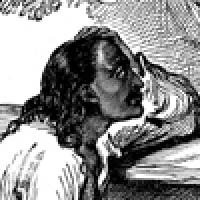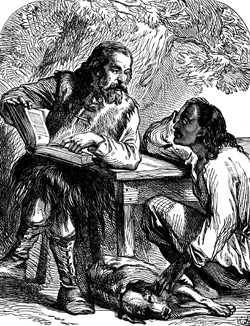
Mathematical man Friday
We received the following from Peter Schabil, with a request for help. Can you spot all the mathematical references in this strange article? Or any other references beyond maths? Thanks to everyone who sent in their list of references. We have informed the winner.)
A strange manuscript has come into my possession. There can be no doubt that this was intended as a chapter in Robinson Crusoe's famous Journal, as handwriting experts have matched the writing with Crusoe's own. The reason for its non-appearance in the book is clear, however. Written in a firm hand across the document (presumably by the publisher) are the words:
"Not for inclusion in the book. Our readers want ADVENTURE. No line of abstruse mathematicks ever sold a single copy of a book and such ramblings are DEATH for publishing."
It is, in fact, the mathematical content of the work on which I have been asked to give an opinion, but I have to confess that the mathematical references are perplexing. Perhaps readers can help?
The missing chapter follows in full. I have re-written some of the archaic English of the original but have been faithful to Crusoe's descriptions of the mathematics.
Chapter IX
Relating how I found Friday and civilised him, of his peculiar affinity for numbers and finally, of our parting.
I have told earlier in this Journal of how I rescued my man Friday from the cannibals and in general, of our life together on the island. I would now like to relate more of his peculiar character, and of his passion for argument — I would not call it reasoning — and his tedious mathematicking.

Crusoe and Friday. Image from The Adventures of Robinson Crusoe (New York: McLoughlin Brothers, ND), FCIT.
As I have already said, his first act after rescue was to fall sobbing at my knees; but I was appalled when he intimated that we should treat the cannibals whom I had slain, in the manner they intended for him; that is to eat them! My earliest lesson for him, therefore, was to show by signs and gestures that the world's greatest civilisation did not eat its enemies. I then began to instruct him in his letters and numbers, just as I had learned them in my little school in Yorkshire.
He took to English with great rapidity. For his reading we would use a First Folio Shakespeare I had recovered from the Captain's cabin on my wrecked ship. I revered this book more for its weight and reputation than its content, but Friday read it from cover to cover. He was fond of quoting extracts from the plays at times that amused him. On one occasion we were foraging in the interior of the island, the most mountainous part, in great heat. I explained to Friday that in England I would never go about on foot but would always ride on a fine steed. And so on other occasions when I found the heat of the day oppressive and complained about it, Friday would shout in glee "A horse! A horse! My kingdom for a horse!" I never understood this and found such remarks tedious.
But it was his great acuity with the arithmetick that astonished me. At first he could not even count and when I sent him to seek out the little herds of feral goats that inhabited the island he would refer to any number above three as "many." How quickly he learned! He would ask why in my homeland we reckoned in yards, feet and inches, or else in pounds and tons, no particular unit bearing any simple relationship to another. How much easier, he insisted, to count in tens, and he held up the fingers of his outstretched hands to make his point.
So wearisome did Friday become with his quibbling on numbers that I devised a punishment to keep him occupied during the time we took for our leisure. I set him the task often given to us for misdemeanours at school. We would have to compute the sum of numbers beginning at one, ascending through 2, 3 and 4 and finishing at 100. I knew the answer by heart; 5,050. But this was never any help to me as all the individual additions had to be correct and any mistakes would mean having to start the process afresh. It usually took me hours to complete the punishment. Friday re-appeared with the correct solution in little less than ten minutes. I protested that since he had very little working to show me he must have guessed the answer and he was hot in his denials. He said that he would show me his solution and taking a stick, he began to write the numbers in the firm sand on the seashore, thus;
| 1 | 2 | 3 | ... | 98 | 99 | 100 |
I naturally objected that he was leaving most of the numbers out and could not possibly find an answer. But then he added another line of numbers under the original one, as follows;
| 1 | 2 | 3 | ... | 98 | 99 | 100 |
| 100 | 99 | 98 | ... | 3 | 2 | 1 |
I could bear no more of his nonsense and angrily erased his writing in the sand. I said that he might guess the sum of all numbers up to 100, but that he would be hard-pressed to take the method up to 250, a number I plucked from the air. I felt immediately that I had been a little rash. I had no idea what the answer was and how therefore would I gainsay any answer that Friday might produce? He gave me the answer in less than a moment: 31,375. The size of this number troubled me and I had to bite my tongue. It took me many weeks before I was able to confirm by laborious computation that Friday was right.
I could not enquire into his method since I could not bear to lose face; but Friday, perhaps sensing this, tried to explain his reasoning. He said that by a process of argument and figuring (he used strange words for these processes) he was able to write down what he called a "truth". In this way anyone might apply the "truth" and solve similar problems no matter what actual numbers were involved. He asked whether this might be useful in my home in England, whose virtues I had tried to explain, but which he could scarcely grasp. I grew angry once more, and said that no process, no "truth", concocted on this savage island could possibly apply in my civilised homeland and there the matter rested.
It was the same when, in setting out the foundations for a rectangular shed for our store, I introduced Friday to the concept of a right angle. I showed him how the wonderful triangle with sides 3, 4 and 5 units naturally forms a right angle and he was quick to grasp the rule I had been taught involving squaring the numbers, so that for example:
32 + 42 = 52
I told him, as I had been instructed, that these were the only whole numbers for which this relationship was true. He became very quiet. He then asked whether 5, 12 and 13 were not whole numbers, as if they were, 52 + 122 = 132! It took me some minutes to confirm this and to my astonishment, he began to reel off many more such numbers. He then perplexed me by asking the following question:

Friday instructing Crusoe. Image from The Adventures of Robinson Crusoe (New York: McLoughlin Brothers, ND), FCIT.
"If it is so that any whole numbers may be found to satisfy forms such as 5 + 6 = 11 and 7 + 6 = 13, why should it be so that only certain whole numbers can be found when squaring is involved?" Were there any whole numbers to be found if one thought in terms of the cubes, and indeed, of higher powers? He went away deep in thought.
After a week he returned to my hut in great excitement. He told me that no whole numbers a, b and c could be found to satisfy an expression such as
an + bn = cn,
where n is a whole number greater than 2. This notation troubled and confused me and at first I mocked him. I said that he was mixing his letters and his figures and the arithmetick could not comprehend such a concoction. But he persevered and said that he had one of his "truths" which was so elegant (he did not use this exact word but one descriptive of the taste of an excellent fruit we occasionally found on the island) that it could be written within the margin of a page of my Shakespeare Folio! I was outraged. I had secretly been trying my own prowess at the arithmetick and was confident that I would shortly find acceptable numbers for the cubic form and even for higher powers. That Friday proposed defacing my Shakespeare with this "truth" and that a convincing explanation could be found which would fit within the margin of the book increased my anger and I boxed his ears. We did not speak for many weeks but Friday would come across me trying the numbers hoping to find some that would answer to the case of the cubes. He would shake his head and mutter "Tomorrow, and tomorrow, and tomorrow, creeps in this petty pace from day to day." I never understood his meaning.
We resolved our differences somewhat when I explained to Friday that if we were to build a stockade we could capture some of the feral goats and by selective breeding we might ensure our supplies of milk, flesh and hides that we could use for clothing or furnishings. I had set my heart on a circular enclosure with a fixed area of one acre (this would sustain grazing for twenty animals) but I could not compute the radius of this because I had forgotten the value of π I would need for the calculation. Friday looked at me queerly and suggested that instead, we might construct a square stockade whose area exactly matched my circular form (he stressed the word "exactly") and only let off sniggering when I expressed enthusiasm for doing just this. He said he would give the matter thought and went away.
I tried to compute π by measurement, by drawing circles as best I could and measuring around the circumference but nothing I did yielded what I remembered dimly as the correct value. Then I saw Friday on the shore. He had cut a straight stick about a foot in length and had drawn a series of parallel lines in the hard sand whose spacing was exactly the length of the stick. He then threw his stick into the air and observed where it landed in relation to the lines he had drawn. I took this for idle nonsense but later that night he came to me and announced that the value of π was 3.14159. My memory was restored and I could see that this was correct, albeit that I did not remember so many digits. I thought better of challenging Friday on this, however. What stunned me was his revelation that π could be computed simply by observing whether or not the falling stick settled on one of the lines!

Crusoe and Friday out shooting. Image from The Adventures of Robinson Crusoe (New York: McLoughlin Brothers, ND), FCIT.
He tried my patience on many such occasions. He talked of the special beauty of numbers divisible only by themselves. What possible use could such numbers ever be, I protested. He then raved about what I could only comprehend as "numbers of the imagination"! I despaired, and it was not with some small relief that one day I saw privateers landing on the island. They offered me the means of rescue and I said that I would pay them when we were safely delivered to Jamaica, where my business partners would easily meet the ransom. At first they refused to take Friday but I insisted and we negotiated a supplementary figure.
Once in Jamaica I secured funds and booked us both a passage to England. The voyage home was boring, but Friday entertained the other passengers and crew with his mathematickal tricks. He fell in with some of the company who were travelling to London for what he described to me as "market speculation". I was very fearful, the more so when after reaching London, Friday told me that he would not accompany me to York but would try the coffee houses of the City where much financial wrangling took place. I gave him a little money and we parted sorrowfully.
A year passed and I set to writing this Journal. Then one spring morning a fine carriage drew up outside my Yorkshire home. Out stepped Friday, quite the gentleman! He tactfully refused the home-brewed ale and brawn sandwiches I asked my servant to fetch and instead we dined at the finest hostelry in York. He paid in gold. When he told me that he was returning to the Caribbean I rejoiced. Would he not buy a simple house and live once more the outdoor life we had enjoyed as castaways? This time he scoffed at me. He said that he would set up a financial house and would build up a great fortune. I asked how he would fund this venture and he replied "Virtually from nothing!" At this my old anger and frustration returned and I shouted "Nothing will come of nothing, speak again!" Friday clapped me on the back and with much laughter said "I see that you have been improving your reading!" His meaning was lost on me.
I heard nothing more for another year then a special package was brought to me from the mail coach that had just arrived from London. I read the contents with great astonishment. The paperwork was headed Friday Bank of Grand Cayman and in his covering letter Friday offered me an opportunity that he said would make me richer than an English Lord. All I would need to do was invest one hundred pounds sterling with his bank. It would go into what he called a "hedge fund" and multiply my investment a thousand-fold. At this point I despaired once more. What need of hedges on tropical islands? Where were the sheep, the cattle and fine horses requiring to be enclosed in this way? A glance at the tranquil fields beyond my window convinced me that my friend had finally lost his faculties. I burned his letter and his offer and never heard from him again.
(SIGNED)
Robinson Crusoe, Gentleman; York, 1719.
To find out if you found all the references, see here.

About the author
Peter Schabil studied mathematics and philosophy at the University of Ulm. He has undertaken consultancy assignments for government and private clients and is author of the popular works Entropy for investment bankers and Green's functions and the environmental lobby.
Comments
Anonymous
excellent entertainment!
Anonymous
Peter, are you as imaginary as your lovely tale? I googled you, and get the most interesting results. Peter Pansexual is the first. And then there's a Nigerian blog (Real Bubbler) that seems to attach itself to the article above for the purposes of the search even though It has never mentioned you in its life.
It has been ever so long since I read Robinson Crusoe, but I have a hunch the author did not let out any hints in the other chapters of how wise Friday is. I loved this.
Anonymous
Yes I'm real. Don't know about those blogs tho: ( Peter Pansexual??)
Glad you liked the article & maybe you can have a go at the competition.
Tschuss
Peter
Anonymous
I liked this article but there are a few inaccuracies. How could someone suggest a hedge fund that long ago, when they were not invented until the 1950s. Also, as I am in banking, I've tried to find Peter Schabil's article on entropy for investment bankers. No luck. As I've read it entropy is about disorder. That's not what we do in banking.
Anonymous
I've figured out how Friday managed to pull of the 5050 trick. I actually have used it before many times. You take the highest number plus on, then you multiply it by 1/2 the highest number. Example, (13098+1)/(0.5x13098) and you would get 85785351 for your answer. now you can go ahead and add them up and you'll get the exact same answer. Even if there's a decimal, it works.
Anonymous
Much easier this way:
1 2 3 .... 98 99 100
100 99 98 .... 3 2 1
Add the top number below it they all add to 101.
100+1=101
99+2=101
98+3=101
There are 100 101's, therefore 100x101= 10100. 10100 is total of two sets of 100's, we need total sum of one set. So we 10100/2=5050. Simple rule is add one to the Last digit i.e. 100 and make it 101 time it by the origial number, devide by 2. So the TRUTH/RULE is:
n +1 x n / 2 = total sum of n
Suppose we want to find out total sum of 785 therefore n is 785.
785+1x785/2 =308505
Anonymous
Friday hinted 101 rule going to 100. Your method of resolving is novel and works perfectly but it is not hinted by Friday. I have demonstrated what Friday was going to establish if he was not interrupted.
Anonymous
I forgot to include my equation in my previous comment. it is (n+1)/(1/2n)
Anonymous
This is actually Fermat's Last Theorem: Pierre de Fermat said he had a proof that there were no integer values of a,b and c, if n was greater than 2. He wrote in the margin of a book called 'Arithmetica" that: "I have discovered a truly marvelous demonstration of this proposition that this margin is too narrow to contain." Which is similar to what Friday said in this chapter. It is commonly thought that Fermat did not have a proof, as one was never found. This theorem was eventually proved over 350 years later by Professor Andrew Wiles.